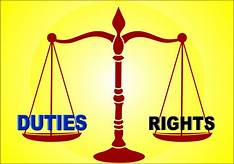Published on: December 16, 2021

INTEGRATION OF RIGHTS AND DUTIES
INTEGRATION OF RIGHTS AND DUTIES

- The Fundamental Rights are defined as the basic human rights of all citizens. These rights, defined in Part III of the Constitution, applied irrespective of race, place of birth, religion, caste, creed, or gender.
- The Fundamental Duties’ are defined as the moral obligations of all citizens to help promote a spirit of patriotism and to uphold the unity of India.
SHOULD OUR RIGHTS COALESCE WITH OUR DUTIES
- By duty here they do not mean the concomitant obligations that spring out of constitutional promises, but a set of ideals that were written into the Constitution during the acme of the Indira Gandhi-imposed Emergency. In their belief, these otherwise non-binding obligations — the “fundamental duties” as Article 51A describes them — ought to be treated on a par with, if not superior to, the various fundamental rights that the Constitution guarantees. In an inversion of the well-known dictum, they see duties, and not rights, as trumps.
- To be sure, it is a basic proposition that all rights come with duties. But those duties are quite distinct from the meaning ascribed to them in the popular discourse. When a person holds a right, she is owed an obligation by a duty-bearer. For example, when citizens are promised a right against discrimination, the government is obliged to ensure that it treats everybody with equal care and concern. Similarly, the guarantee of a right to freedom of speech enjoins the state to refrain from interfering with that liberty.
- An idea that our rights ought to be made conditional on the performance of a set of extraneous obligations is plainly in the teeth of the Constitution’s text, language, and history.
RIGHTS, LIMITATIONS
- The Constituent Assembly was clear in its belief that the Constitution’s emphasis must always rest on individual dignity. That is, the Constitution’s chief purpose must be to preserve and guarantee basic human rights, to equality, to autonomy, and to liberty, among others.
- Importance placed on every person’s ethical independence did not mean that rights were seen as absolute warrants.
- Part III of the Constitution in which fundamental rights are nestled, contains within it a set of limitations. However, none of those restrictions places a burden on citizens to perform duties as a condition for the enforcement of rights.
- The Constitution’s framers saw the placing of mandates on individual responsibilities as nothing more than a legislative prerogative. Any such imposition would have to conform to the language of fundamental rights, but Parliament was otherwise free to dictate personal behaviour.
- For example, the legislature could impose a duty on individuals to pay a tax on their income, and this duty could be enforced in a variety of ways. If the tax imposed and the sanctions prescribed were reasonable, the obligations placed on the citizen will be constitutionally valid.
MANY DUTIES
- Parliament and the State legislatures have imposed a plethora of duties
- These laws cannot make a person’s fundamental right contingent on the performance of a duty that they impose. A legislation that does so will violate the Constitution.
- To sustain a society, to live peacefully together, one must take seriously our civic responsibilities. But any talk aimed at making these obligations central, and at melding our rights with duties, is aimed only at undermining the Constitution. In its original form, the Constitution did not enlist any obligations that an individual was bound to follow. The fundamental duties that are now contained in Article 51A were introduced through the infamous 42nd constitutional amendment.
- The Swaran Singh Committee, which was set up during the Emergency, and which recommended the insertion of the clause, also suggested that a failure to comply with a duty ought to result in punishment. Ultimately,
- In its finally adopted form, Article 51A encouraged citizens to perform several duties
- When the Emergency came to pass, these directives were largely seen in innocuous terms — for one, they were considered too vague to make any meaningful difference.
- But today, when our popular discourse veers towards a need to place an emphasis on duty over right, the Constitution’s basic ethos once again comes under threat. What these demands overlook is that the social revolution that the Constitution was meant to herald was underpinned by a belief that it is only a guarantee of rights — unimpeded by duty — that could help usher India into a free and egalitarian future.
WAY FORWARD
- We may want to ask ourselves if the promise of a right to free expression imposes on the state something more than a duty to forebear from making an unwarranted restriction on that liberty.
- Does it require the state to also work towards creating an equal society where each person finds herself in a position to express herself freely.
- Similarly, does the right to life include within it a positive obligation on the state to provide shelter, livelihood, and health care
- When we speak about the importance of obligations, it is these questions that must animate our discussions. Should we instead allow the language of fundamental duties — as contained in Article 51A — to subsume our political debates, we would only be placing in jeopardy the moral principles at the heart of India’s republic.

